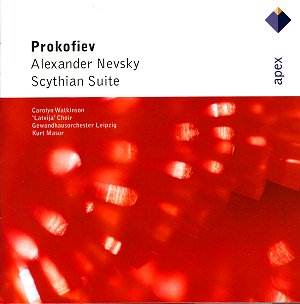This budget Apex Prokofiev coupling from Kurt Masur
was, I have to confess, completely new to me. It has, presumably, been
unearthed from the Teldec archives, and enters a pretty crowded and
highly competitive field. There is the excellent EMI
Double Fforte from Previn and the LSO, which couples Alexander
Nevsky with the oratorio arrangement of another Eisenstein collaboration,
Ivan the Terrible, a logical and worthwhile pairing. There is
the lower
mid-price RCA disc from Reiner and the Chicago SO, which has Nevsky
paired with the Lieutenant Kije suite and Glinka’s Ruslan
overture, stunning performances in generally good sound, though climaxes
are a little congested. There is also, and probably best of all, the
mid-price Abbado DG disc which has the same coupling as Masur, but also
manages quite easily to find room for the Kije suite, thus representing
excellent overall value, even at the slightly higher price.
If we take the stunning Ala and Lolli music
that the 23-year old Prokofiev wrote for Diaghilev’s Ballet Russes first.
This is a young composer clearly influenced by the Rite of Spring,
and revelling in it. Pounding rhythms, loud dissonances, big orchestral
effects and an exotic sound-world show the young firebrand very much
at home in his barbaric subject matter. Masur’s Leipzig orchestra acquit
themselves well, though to turn to Abbado and the Chicago SO is to hear
a different level of music-making. Abbado was always at home with this
music, and his superbly drilled band offer levels of virtuosity that
all but silence criticism. Take the second section, entitled Tshushbog
and the Dance of the Spirits. Here Prokofiev sets up one of his
favourite toccata-like ostinatos, over which the huge brass section
scream their primitive folk-like material. In Masur’s hands, it all
sounds a mite too tame and polite, and the fractionally slower tempo
robs the music of its ferocious momentum. Abbado drives his Chicago
forces relentlessly, and though this is not for the faint-hearted, the
results are thrilling. Masur certainly shapes the more tender moments
with great care for detail – the Night movement is very atmospheric,
almost expressionistic, but Abbado is equally sensitive to these mood
shifts, and offers a performance of greater flair and contrast.
Some of the same comparative criticisms can also be
made against Masur’s Nevsky, though on the whole it is more successful.
This is partly due to the choral singing, which is tightly controlled,
well balanced and in tune, no easy task in a live rendition of this
score. Abbado’s LSO Chorus are also on excellent form, and the differences
in these two performances are more subtle than in the Scythian Suite.
Masur’s opening sends less of an icy chill down the spine, and his shaping
of the opening string figuration is a little matter-of-fact. Abbado’s
LSO woodwind really pierce the texture and set the scene for us. Masur
has plenty of bite and attack in the third section, entitled The
Crusaders in Pskov, and his brass section clearly enjoy themselves
– the tuba is suitably dominant in the central episode, though this
could be false microphone highlighting. The famous Battle on the
Ice starts with some awkwardly notated string writing that the Leipzig
orchestra do not quite get around, though they make up for it in a marvellously
controlled ponticello passage at 2.03. The marching armies are
also helped along by Masur, who includes an unmarked but effective accelerando
into the main Allegro. Abbado is also superb here, and whips up great
excitement at the climactic points.
Carolyn Watkinson makes a moving soloist in the Field
of the Dead lament, though Elena Obraztsova sounds fractionally
more idiomatic in this same section for Abbado, her slightly steelier
tone bringing a chill rather than any comfort. The great final hymn
to the motherland, Alexander’s Entry into Pskov, is excellent
in both accounts, and it could be said here that Masur has the edge,
his live rendition eliciting a suitably triumphant dénouement
from his forces.
Recording quality is good rather than outstanding in
the Masur, and the engineers have not overcome live problems of balance.
The sound is more immediate on the Abbado disc, which certainly helps
in music of this sort. Overall, it is hard to recommend Masur in preference
to Abbado, his DG disc being one of the very best things he has given
us. The extra music makes up for the price difference, and the playing
from the Chicago Symphony and LSO is superb. If you’re on a severe budget,
you probably won’t be disappointed in Masur, but pay the extra – it’ll
be worth it.
Tony Haywood


